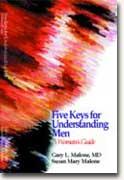Five Keys to
Understanding Men
Gary L. Malone &
Susan Mary Malone

book reviews:
· general fiction
· chick lit/romance
· sci-fi/fantasy
· graphic novels
· nonfiction
· audio books
· children's books @
curledupkids.com
newsletter
win books
buy online
links
home
for authors
& publishers
for reviewers

|
Five Keys
for Understanding Men Gary L. Malone, MD & Susan Mary Malone Authorlink Press Paperback 252 pages September 1999 
|
|
"unveil the five hidden keys to the male mind... you can understand (and deal with) over eighty percent of a man's behavior as well as decipher the motivation behind it."  The book is organized around five not-so-hidden male principles that may
parallel man's stages of psychological development: The book is organized around five not-so-hidden male principles that may
parallel man's stages of psychological development:
All but one chapter ends with a set of questions and answers, for example p. 51's "Question: I give my husband everything I can -- love, comfort, food -- and he seems appreciative. When it's 'my time' in the bedroom, he seems like a little boy! I'm frustrated.Unless you have been exposed to Freud's theory of psychosexual development, or have been in psychotherapy, the jargon (quiescently, counter-phobic, castration, count coup) and statements (such as p.49, "Sex is more intense for men and does more inter-psychically;" and p.174, "Women usually form tighter bonds in adult life than men.") overgeneralize and obscure potentially factual, quasi-scientific assertions. Dr. Malone offers personal examples and poignant memories of his early life in Texas with his father and brother (like when Dad arrives just in time to shoot a rattlesnake as it prepares to strike Gary and older brother Mike after they quit hunting doves), peers (boys clubs with no girls allowed), then later with colleagues, to illustrate male drives in action and the consequences of bonding, and failing to bond, with males. He discusses men's aggressive and sexual drives, attendant fears and guilt (symbolic "pissing contests," machismo, and tribal preoccupations with sex, dominance, mastery, and control) and compensatory activities (working with tools, cars, gadgets; the bar scene; hunting, fishing, and cleaning game; football, TV, fantasy and team sports). The authors warn of toxic males who may be unable to make healthy mates (e.g., chemically dependent, sociopaths, sex perverts, pedophiles, homosexuals or bisexuals). They lay out specific cautions to consider in any new or serious relationship. One can only wonder how these keys for understanding interact with the multiple realities of dating, mate assessment, love, and social selection processes. The personal resources needed and introspection required to make "wise choices" in emergent relationships make self-analysis a difficult, but worthwhile goal. The authors, acutely aware of human limitations, go beyond the book's initial goal to repeatedly assert that abused women should get out of conflicted relationships early. They urge men and women at any age to deal with unresolved conflicts and relationship issues by using appropriate, professional treatment. The reviewer recommends Five Keys for Understanding Men: A Women's Guide for any one willing to do the moral inventory, then develop the skills needed to cut through denial, guilt, and fear to learn how to manage, resolve, or leave an abusive and otherwise failing relationship. © 2001 by David L. Johnson, Ph D, for Curled Up With a Good Book |
|
|
|
Click here to learn more about this month's sponsor! |
|
| fiction · sf/f · comic books · nonfiction · audio newsletter · free book contest · buy books online review index · links · · authors & publishers reviewers |
|
| site by ELBO Computing Resources, Inc. | |